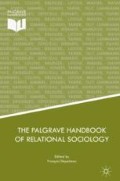Abstract
With his concept of association, Bruno Latour founds his symmetry principle in a relativistic and pluralist sociological conception of society as networked actors. Social reality is a mixture of heterogeneous humans and non-humans, and their associations lead to a collectivity. The unpredictability of associations is directly connected with the heterogeneity of the associated elements and the associations themselves. Associations are not necessarily planned, even if the actors/actants act strategically. Because associations are unforeseeable, new combinations of associations can occur at any time unexpectedly; and consequently, they lead to inequality between constituted associations, in other words, to asymmetries. Associations are at the heart of the networks that represent society as a relational and movable reality.
References
Bloor, David. 1976. Knowledge and Social Imagery. London: Routledge.
———. 1999. Anti-Latour. Studies in the History and Philosophy of Science 30 (1): 81–112.
Bourdieu, Pierre. 2004. Science of Science and Reflexivity. Chicago: University of Chicago Press.
Bowker, Geof, and Bruno Latour. 1987. A Booming Discipline Short of Discipline: (Social) Studies of Science in France. Social Studies of Science 17 (4): 715–748.
Callon, Michel, and Bruno Latour. 1981. Unscrewing the Big Leviathan: How Actors Macrostructure Reality and How Sociologists Help Them to Do So. In Advances in Social Theory and Methodology. Toward an Integration of Micro- and Macro-sociologies, ed. Karin Knorr-Cetina and Aaron V. Cicourel, 275–303. London: Routledge.
Dosse, François. 1997. L’empire du sens. L’humanisation des sciences sociales. Paris: La Découverte.
Latour, Bruno. 1986. The Powers of Association. In Power, Action and Belief. A New Sociology of Knowledge? Sociological Review Monograph, ed. John Law, vol. 32, 264–280. London: Routledge.
———. 1987. The Enlightenment without the Critique: A Word on Michel Serres’ Philosophy. In Contemporary French Philosophy, ed. A. Phillips Griffiths, 83–98. Cambridge: Cambridge University Press.
———. 1988a. Mixing Humans and Nonhumans Together: The Sociology of a Door-Closer. Social Problems 35 (3): 298–310.
———. 1988b. How to Write ‘The Prince’ for Machines as Well as for Machinations. In Technology and Social Change, ed. Brian Elliott, 20–43. Edinburgh: Edinburgh University Press.
———. 1991. Technology Is Society Made Durable. In A Sociology of Monsters: Essays on Power, Technology and Domination, ed. John Law, 103–131. London: Routledge.
———. 1993a. We Have Never Been Modern. Cambridge: Harvard University Press.
———. 1993b. Petites leçons de sociologie des sciences. Paris: La Découverte.
———. 1996. Aramis or the Love of Technology. Cambridge: Harvard University Press.
———. 1999a. Pandora’s Hope. Essays on the Reality of Science Studies. Cambridge: Harvard University Press.
———. 1999b. For Bloor and Beyond’ – a Reply to David Bloor’s ‘Anti-Latour’. Studies in History & Philosophy of Science 30 (1): 113–129.
Latour, Burno. 2001. Das Parlament der Dinge. Für eine politische Ökologie. Frankfurt am Main: Suhrkamp.
Latour, Bruno. 2002. Gabriel Tarde and the End of the Social. In The Social in Question. New Bearings in History and the Social Sciences, ed. Patrick Joyce, 117–132. London: Routledge.
———. 2005a. La science en action. Introduction à la sociologie des sciences. Paris: La Découverte.
———. 2005b. Reassembling the Social an Introduction to Actor-Network-Theory. Oxford and New York: Oxford University Press.
———. 2012. Enquête sur les modes d’existence. Paris: La Découverte.
Latour, Bruno, and Steve Woolgar. 1979. Laboratory Life. The Social Construction of Scientific Facts. London: Sage.
Latour, Bruno, and Emilie Hermant. 1998. Paris, Ville Invisible. Paris: La Découverte.
Latour, B., Ph. Mauguin, and G. Teil. 1992. A Note on Socio-Technical Graphs. Social Studies of Science 22 (1): 33–57.
Lorenz, Stephan. 2009. Case Reconstruction, Network Research and Perspectives of a Procedural Methodology. Forum Qualitative Sozialforschung/Forum: Qualitative Social Research 9(1), 10. http://nbn-resolving.de/urn:nbn:de:0114-fqs0801105
Lorrain, François, and Harrison C. White. 1971. Structural Equivalence of Individuals in Social Networks. The Journal of Mathematical Sociology 1 (1): 49–80.
Schmidgen, Henning. 2008. Die Materialität der Dinge? Bruno Latour und die Wissenschaftsgeschichte. In Bruno Latours Kollektive. Kontroversen zur Entgrenzung des Sozialen, ed. Georg Kneer, Markus Schroer, and Erhard Schüttpelz, 15–46. Frankfurt am Main: Suhrkamp.
Serres, Michel. 1992. Eclaircissements. Cinq entretiens avec Bruno Latour. Paris: François Bourin.
Strum, Shirley, and Bruno Latour. 1987. Redefining the Social Link: From Baboons to Humans. Social Science Information 26 (4): 783–802.
White, Harrison. 1992. Identity and Control: A Structural Theory of Social Action. Princeton: Princeton University Press.
Author information
Authors and Affiliations
Editor information
Editors and Affiliations
Rights and permissions
Copyright information
© 2018 The Author(s)
About this chapter
Cite this chapter
Papilloud, C. (2018). Bruno Latour and Relational Sociology. In: Dépelteau, F. (eds) The Palgrave Handbook of Relational Sociology. Palgrave Macmillan, Cham. https://doi.org/10.1007/978-3-319-66005-9_9
Download citation
DOI: https://doi.org/10.1007/978-3-319-66005-9_9
Published:
Publisher Name: Palgrave Macmillan, Cham
Print ISBN: 978-3-319-66004-2
Online ISBN: 978-3-319-66005-9
eBook Packages: Social SciencesSocial Sciences (R0)

